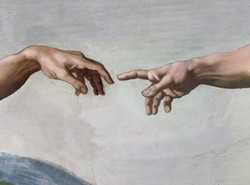
Literature also will fail to arrive at and to sustain itself in its perfected life and beauty without the spirit of God in it.
Take, for instance, the single department of history, which is undoubtedly one of great importance and interest. The importance of history is seen, when we consider that the history of the deeds and sufferings of man is at the same time the history of the dealings of God with man. It details the conflicts of virtue and vice and anticipates, in the conclusion of its pages, the destruction of the one, and the final victory of the other. There is a close connection between human history and the coming of Christ in the world; — as the incidents in the history of all nations, previous to that event, seem to have been arranged in reference to it, and all subsequent history has been influenced by it. And, in this point view, many judicious persons have been disposed with much reason, to set a high value upon the work of President Edwards, entitled "The History of Redemption." The object of this interesting work is, to give an outline of the history of the human race, in connection with the history of redemption; — uniting the two in such a manner as to show their reciprocal relations and influences. And the history is exceedingly valuable, not because it illustrates the idea of history in all respects, but because it so fully introduces an element, or point of view, which is generally left out.
As a general thing, history has limited itself to giving an account of national wars. It has been so written, for she most part, as to be a commemoration of deeds of violence, so that he, who kills the most and conquers the most, however deficient in civic and moral virtues, holds the prominent position, and is made the subject of undue panegyric. But history, in order to be a true record of the human race, should embrace not only war, but also civil and political events, and the progress of the arts and literature; — so that the man, who serves his country by peaceful labors and excellencies, may have his reward, as well as the warrior.
A favorable change, however, has already taken place. The spirit of the Gospel is beginning to take effect. The rights, the happiness, the immortal interests of the masses of men are receiving a consideration which they have not received before. And history at last sees the wisdom of placing the man who has made improvements in some useful art, or has done some benevolent deed, on a footing at least with those who command armies. And so far as the historian, looking to God and receiving direction from that source, has an eye to the good of mankind and the claims and advancement of virtue, he is in union with God. And this is at the same time his highest honor, and the source of his highest power.
The doctrine of divine union applies to everything.
Edited from A Treatise on Divine Union Part 7, Chapter 8 by Thomas Cogswell Upham. His blog is managed by Craig L Adams and can be found here: http://thomascupham.blogspot.com
 RSS Feed
RSS Feed